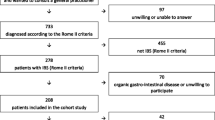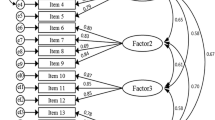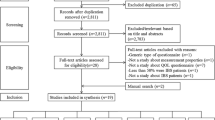Abstract
Objectives: To evaluate the burden of illness in irritable bowel syndrome (IBS), in terms of resource utilisation (direct and indirect) and health-related quality of life (HR-QOL), in individuals with IBS who meet Rome I and Rome II criteria.
Methods: A cross-sectional study, carried out by personal interview, on a representative sample (n = 2000) of the Spanish population. Individuals with suspected IBS were identified via a screening question and subsequently given an epidemiological questionnaire to complete. The questionnaire collected information on IBS symptoms, resource utilisation, and HR-QOL [Medical Outcomes Study 36-item Short Form (SF-36)].
Results: Sixty-five individuals met Rome II criteria for IBS, while 146 individuals met exclusively Rome I criteria. Of Rome II individuals, 67.7% had consulted some type of healthcare professional in the previous 12 months, compared with only 41.8% of those individuals meeting exclusively Rome I criteria (p < 0.001). In the same vein, similar findings were observed (p < 0.01) for the variables: ‘diagnostic tests’ (35.4 vs 17.1%); ‘drug consumption’ (70.8 vs 45.2%); and ‘reduced performance in main activity’ (60 vs 27.4%). Compared with the general population, the study sample reported significantly worse HR-QOL scores in four dimensions of the SF-36 (‘bodily pain’, ‘vitality’, ‘social functioning’ and ‘role-emotional’. Additionally, individuals meeting Rome II criteria reported worse HR-QOL scores than those individuals meeting exclusively Rome I criteria, especially in the ‘bodily pain’ and ‘general health’ dimensions.
Conclusions: The burden of illness in IBS is important and correlated to the diagnostic criteria employed. Individuals who met Rome II criteria reported a higher level of resource utilisation and worse HR-QOL than individuals meeting exclusively Rome I criteria.






Similar content being viewed by others
References
Weisbrod B. Economics of public health. Philadelphia (PA): University of Pennsylvania Press, 1961
Byford S, Torgerson DJ, Raftery J. Cost of illness studies. BMJ 2000; 320: 1335
Lubitz JD, Riley GF. Trends in medicare payments in the last year of life. N Engl J Med 1993; 328: 1092–6
Jacobs P. The economics of health and medical care. 3rd ed. Rockville: Aspen Publishers, 1991
Mearin F, Badia X, Balboa A, et al. Irritable bowel syndrome prevalence varies enormously depending on the employed diagnostic criteria: comparison of Rome II vs previous criteria in a general population. Scand J Gastroenterol 2001; 36 (11): 1155–61
Jones R, Lydeard S. Irritable bowel syndrome in the general population. BMJ 1992; 304: 87–90
Talley NJ, Zinsmeister AR, Van Dyke C, et al. Epidemiology of colonic symptoms and the irritable bowel syndrome. Gastroenterology 1991; 101: 927–34
Agreus L, Svardsudd K, Nyren O, et al. The epidemiology of abdominal symptoms: prevalence and demographic characteristics in a Swedish adult population. A report from the Abdominal Symptom Study. Scand J Gastroenterol 1994; 29: 102–9
Bommelaer G, Rouch M, Dapoigny M, et al. Epidemiology of the irritable bowel syndrome. Gastroenterol Clin Biol 1990; 14: 9C–12C
Kennedy TM, Jones RH, Hungin APS, et al. Irritable bowel syndrome, gastro-esophageal reflux, and bronchial hyper-responsiveness in the general population. Gut 1998; 43: 770–4
Saito YA, Locke GR, Talley NJ, et al. A comparison of the Rome and manning criteria for case identification in epidemiological investigations of irritable bowel syndrome. Am J Gastroenterol 2000; 95: 2816–24
Boyce PM, Koloski N, Talley NJ. Irritable bowel syndrome according to varying diagnostic criteria: are the new Rome II criteria unnecessarily restrictive for research and practice? Am J Gastroenterol 2000; 95 (11): 3176–83
Camilleri M, Williams DE. Economic burden of irritable bowel syndrome proposed strategies to control expenditures. Pharmacoeconomics 2000; 17 (4): 331–8
Heaton KW, O’Donell LJD, Braddon FEM, et al. Symptoms of irritable bowel syndrome in a British urban community: consulters and nonconsulters. Gastroenterology 1992; 102: 1962–7
Talley NJ, Zinsmeister AR, Melton LJ. Irritable bowel syndrome in a community: symptom subgroup, risk factors and health care utilization. J Epidemiol 1995; 142: 76–83
Talley NJ, Gabriel SE, Harmsen WS, et al. Medical costs in community individuals with irritable bowel syndrome. Gastroenterology 1995; 109: 1736–41
Hahn BA, Yan S, Strassels S. Impact of irritable bowel syndrome on quality of life and resource use in the United States and United Kingdom. Digestion 1999; 60: 77–81
Chassany O, Bergmann JF. Quality of life in irritable bowel syndrome, effect of therapy. Eur J Surg 1998; Suppl. 583: 81–6
Whitehead WE, Burnett CK, Cook EW, et al. Impact of irritable bowel syndrome on quality of life. Dig Dis Sci 1996; 41: 2248–53
Sperber AD, Safieh YA, Jaffer AA, et al. A comparison of the prevalence of IBS using Rome I and Rome II criteria in an epidemiological survey [abstract]. Gastroenterology 2000; 118: 397
Thompson WG, Longstreth GF, Drossman DA, et al. Functional bowel disorders and functional abdominal pain. Gut 1999; 45 Suppl. 2: 1143–7
Thompson WG, Dotevall G, Drossman DA, et al. Irritable bowel syndrome: guidelines for the diagnosis. Gastroenterol Int 1989; 2: 92–5
Instituto Nacional de Estadística, 1998. España en cifras. Madrid: INE, 1998
Alonso J, Prieto L, Antó JM. The Spanish version of the SF-36 Health Survey: a measure of clinical outcomes. Med Clin (Barc) 1995; 104: 771–6
Alonso J, Regidor E, Barrio G, et al. Population-based reference values for the Spanish version of the Health Survey SF-36. Med Clin (Barc) 1998; 111: 410–6
Ho KY, Kang JY, Seow A. Prevalence of gastrointestinal symptoms in a multiracial Asian population, with particular reference to reflux-type symptoms. Am J Gastroenterol 1998; 93: 1816–22
Akehurst RL, Brazier JE, Mathers N. Health-related quality of life and cost impact of irritable bowel syndrome in a UK primary care setting. Pharmacoeconomics 2002; 20 (7): 455–62
Hahn BA, Kirchdoerfer LJ, Fullerton S, et al. Patient-perceived severity of irritable bowel syndrome in relation to symptoms, health resource utilization and quality of life. Aliment Pharmacol Ther 1997; 11: 553–9
Sandler RS. Epidemiology of irritable bowel syndrome in the United States. Gastroenterology 1990; 99: 409–15
Drossman DA, Li Z, Andruzzi E, et al. US householder survey of functional gastrointestinal disorders: prevalence, sociodemography, and health impact. Dig Dis Sci 1993; 38: 1569–80
Hahn BA, Saunders WB, Maier WC. Differences between individuals with self-reported irritable bowel syndrome (IBS) and IBS-like symptoms. Dig Dis Sci 1997; 42: 2585–90
Luscombe FA. Health-related quality of life and associated psychosocial factors in irritable bowel syndrome: a review. Qual Life Res 2000; 9: 161–76
Alonso J, Prieto L, Ferrer M, et al. Testing the measurement properties of the Spanish version of the SF-36 health survey among male patients with chronic obstructive pulmonary disease. J Clin Epidemiol 1998; 51: 1087–94
Badia X, Castro D, Conejero J, et al. Validity of the King’s Health Questionnaire in the assessment of quality of life in patients with urinary incontinence. Med Clin (Barc) 2000; 114: 647–52
Gralnek IM, Hays RD, Kilbourne A, et al. The impact of irritable bowel syndrome on health related quality of life. Gastroenterology 2000; 119: 654–660
Ministerio de Sanidad y Consumo. Encuesta nacional de salud de España 1997. Madrid: Ministerio de Sanidad y Consumo, 1999
Zinn C. Women consume far more of health budget than expected. BMJ 1998; 317: 838
Rice DP. Cost-of-illness studies: fact or fiction? Lancet 1994; 344: 1519–20
Shiell A, Gerard K, Donaldson C. Cost of illness studies: an aid to decision-making? Health Policy 1987; 8: 317–23
Acknowledgements
This study was supported/funded by Novartis and Glaxo-Wellcome.
Author information
Authors and Affiliations
Corresponding author
Rights and permissions
About this article
Cite this article
Badia, X., Mearin, F., Balboa, A. et al. Burden of Illness in Irritable Bowel Syndrome Comparing Rome I and Rome II Criteria. Pharmacoeconomics 20, 749–758 (2002). https://doi.org/10.2165/00019053-200220110-00004
Published:
Issue Date:
DOI: https://doi.org/10.2165/00019053-200220110-00004




